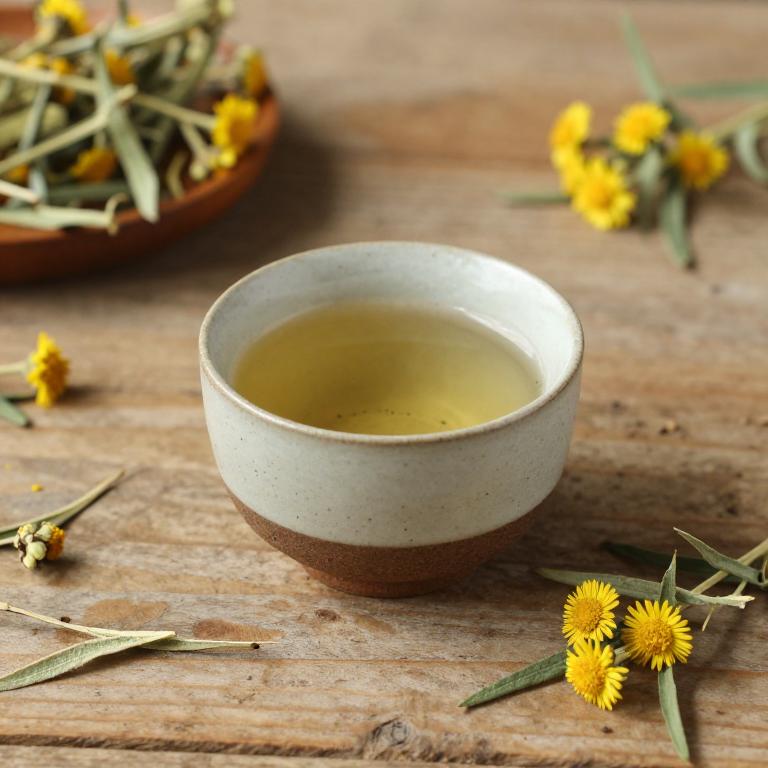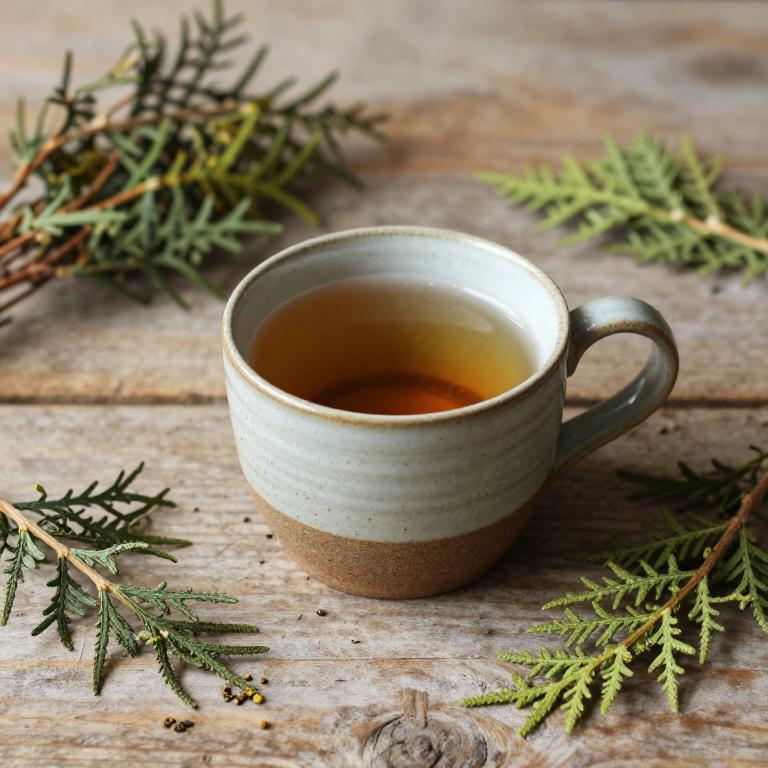10 Best Herbal Teas For Lymph Node Swelling

Herbal teas can play a supportive role in managing lymph node swelling by promoting detoxification and reducing inflammation.
Certain herbs, such as echinacea, ginger, and turmeric, are known for their immune-boosting and anti-inflammatory properties. Drinking these teas regularly may help improve lymphatic flow and support the body's natural healing processes. However, it is important to consult with a healthcare professional before using herbal teas, especially if the lymph node swelling is persistent or accompanied by other symptoms.
While herbal teas can be a complementary therapy, they should not replace medical treatment for underlying conditions causing the swelling.
Table of Contents
- 1. Echinacea (Echinacea purpurea)
- 2. St. john's wort (Hypericum perforatum)
- 3. Stinging nettle (Urtica dioica)
- 4. Blessed thistle (Cnicus benedictus)
- 5. Thyme (Thymus vulgaris)
- 6. Thistle (Silybum marianum)
- 7. Salvia (Salvia officinalis)
- 8. Dog rose (Rosa canina)
- 9. Sweet wormwood (Artemisia annua)
- 10. White cedar (Thuja occidentalis)
1. Echinacea (Echinacea purpurea)

Echinacea purpurea, commonly known as purple coneflower, is a popular herbal remedy often used to support immune function and reduce inflammation.
Herbal teas made from Echinacea purpurea are believed to help alleviate symptoms associated with lymph node swelling, which can occur due to infections or immune responses. The active compounds in Echinacea, such as alkamides and flavonoids, may have anti-inflammatory and immunostimulant properties that could aid in reducing lymphatic inflammation. While some studies suggest potential benefits, more research is needed to fully understand its efficacy for lymph node issues.
As with any herbal remedy, it is advisable to consult a healthcare professional before use, especially for individuals with chronic conditions or those taking medications.
2. St. john's wort (Hypericum perforatum)

Hypericum perforatum, commonly known as St. John's wort, is a herbal remedy that has been traditionally used for its potential anti-inflammatory and immunomodulatory properties.
While it is well-known for its use in treating mild depression, recent studies suggest it may also support immune health, which could be beneficial for individuals experiencing lymph node swelling. The active compounds in hypericum perforatum, such as hypericin and flavonoids, may help reduce inflammation and enhance the body's natural defenses. However, it is important to note that hypericum perforatum can interact with various medications, so it should be used under the guidance of a healthcare professional.
When brewed as a herbal tea, hypericum perforatum may offer a gentle and accessible way to incorporate its potential health benefits into a daily routine.
3. Stinging nettle (Urtica dioica)

Urtica dioica, commonly known as stinging nettle, has been traditionally used in herbal medicine for its potential anti-inflammatory and detoxifying properties.
Herbal teas made from Urtica dioica may support lymphatic health by promoting the drainage of toxins and reducing swelling in the lymph nodes. The plant contains compounds such as flavonoids and polysaccharides that are believed to enhance immune function and reduce inflammation. While there is some anecdotal support for its use in managing lymph node swelling, scientific evidence remains limited, and it should not replace professional medical advice.
It is important to consult a healthcare provider before using stinging nettle tea, especially if you have underlying health conditions or are taking medications.
4. Blessed thistle (Cnicus benedictus)

Cnicus benedictus, commonly known as St. John's wort, is a herbal remedy that has been traditionally used for its anti-inflammatory and immunomodulatory properties.
While it is widely recognized for its potential benefits in mild depression, some studies suggest it may also support lymphatic health by reducing inflammation and enhancing immune function. When used in herbal teas, Cnicus benedictus can help alleviate symptoms associated with lymph node swelling by promoting detoxification and improving circulation. However, it is important to note that it should not replace medical treatment for serious lymphatic conditions.
As with any herbal remedy, it is advisable to consult a healthcare professional before use, especially if you have existing health conditions or are taking other medications.
5. Thyme (Thymus vulgaris)

Thymus vulgaris, commonly known as thyme, is a herbal plant often used in teas for its potential health benefits, including supporting immune function.
While there is no direct scientific evidence that thyme tea specifically targets lymph node swelling, it is believed to have antimicrobial and anti-inflammatory properties that may indirectly support lymphatic health. Some traditional herbal practices suggest that thyme may help reduce inflammation and improve circulation, which could potentially aid in the body's natural processes related to lymph node function. However, it is important to consult a healthcare professional before using thyme or any herbal remedy, especially if experiencing persistent lymph node swelling.
As with any herbal treatment, results may vary, and it should not replace medical advice or treatment for underlying conditions.
6. Thistle (Silybum marianum)

Silybum marianum, also known as milk thistle, is a herbal remedy that has been traditionally used for its potential health benefits, including support for liver function.
While it is most commonly associated with liver health, some studies suggest that its active compound, silymarin, may have anti-inflammatory and antioxidant properties that could help reduce lymph node swelling. These properties may aid in reducing inflammation and supporting the immune system, which can be beneficial for individuals experiencing swollen lymph nodes. However, it is important to consult with a healthcare professional before using milk thistle, especially if you have existing medical conditions or are taking medications.
Although herbal teas made from silybum marianum may offer some supportive benefits, they should not replace conventional medical treatments for lymph node issues.
7. Salvia (Salvia officinalis)

Salvia officinalis, commonly known as sage, has been traditionally used in herbal medicine for its potential anti-inflammatory and antimicrobial properties.
When brewed into a herbal tea, sage may support immune function and help reduce inflammation, which could be beneficial for individuals experiencing lymph node swelling. The active compounds in sage, such as flavonoids and rosmarinic acid, are believed to contribute to its therapeutic effects. However, it is important to consult a healthcare professional before using sage tea, especially if there are underlying health conditions or if symptoms persist.
While sage tea may offer supportive benefits, it should not replace medical treatment for lymph node issues.
8. Dog rose (Rosa canina)

Rosa canina, also known as rosehip, is a traditional herbal remedy that has been used for centuries to support immune health and reduce inflammation.
Its rich content of bioactive compounds, including antioxidants, vitamins C and E, and flavonoids, makes it beneficial for conditions involving lymph node swelling. Rosa canina herbal teas may help alleviate symptoms associated with lymphatic congestion by promoting detoxification and reducing oxidative stress. When consumed regularly, this tea can support the body's natural healing processes and enhance lymphatic function.
However, it is advisable to consult a healthcare professional before using it as a treatment for persistent or severe lymph node swelling.
9. Sweet wormwood (Artemisia annua)

Artemisia annua, commonly known as sweet wormwood, has been traditionally used in Chinese medicine for its potential health benefits, including its role in reducing inflammation and supporting immune function.
Recent studies suggest that the active compound in artemisia annua, artemisinin, may have anti-inflammatory properties that could help alleviate lymph node swelling by reducing immune system overactivity. While herbal teas made from artemisia annua are often consumed for their mild, earthy flavor, they should not be used as a substitute for medical treatment in cases of severe or persistent lymph node enlargement. It is important to consult a healthcare professional before using artemisia annua tea, especially for individuals with chronic conditions or those taking other medications.
Despite its historical use, more research is needed to fully understand its efficacy and safety in addressing lymph node swelling.
10. White cedar (Thuja occidentalis)

Thuja occidentalis, also known as eastern arborvitae, is a commonly used herb in herbal medicine for its potential anti-inflammatory and immune-boosting properties.
Herbal teas made from thuja occidentalis may support the lymphatic system by promoting detoxification and reducing inflammation in the lymph nodes. While some studies suggest that thuja may help alleviate symptoms associated with lymph node swelling, it is important to note that it should not replace professional medical treatment for underlying conditions. The tea is typically prepared by steeping the dried leaves or stems in hot water, and it is often consumed in small quantities to avoid potential side effects.
As with any herbal remedy, it is advisable to consult with a healthcare provider before using thuja occidentalis, especially for individuals with existing health conditions or those taking medications.